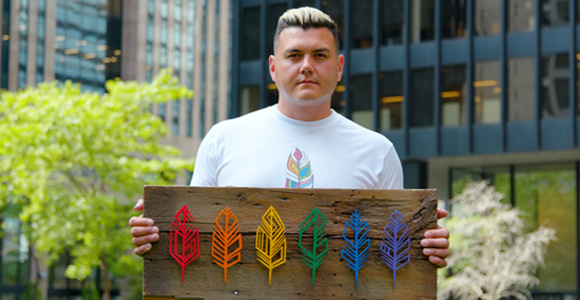Apr 25, 2023
Logistec’s Madeleine Paquin on finding fun in the challenges of the shipping business
, BNN Bloomberg
Industry Insiders: LOGISTEC CEO on the state of North America's supply chain
As the chief executive of Quebec-based shipping company Logistec, Madeleine Paquin has seen firsthand the volatility that’s gripped global supply chains during the pandemic.
There was the issue of cargo at sea with nowhere to dock as countries closed their borders early into the crisis. Then it was congestion at terminals, and whipsawing shifts in consumer demands.
She recalls the ups and downs with a sense of humour and cheerful attitude, and said she expects things to stabilize this year. Through it all, she said the last three years have reinforced the importance of leaders having strong business relationships and solid teams behind them.
“It's rare that you can find solutions in your silo,” she told BNN Bloomberg in an interview from her office in Montreal.
That collaborative leadership principle has helped her grow Logistec into a global marine company that’s expanded into innovative environmental services and water solutions. A key ingredient to Logistec’s success has been involving the team in the company’s goals, Paquin said.
“We spend so much time in our offices or at work, that it's important that the journey be fun.”
LESSONS FROM ENTREPRENEURIAL PARENT
Paquin always saw herself working at the cargo handling business her father founded in Quebec City. But she was thrust into leadership at Logistec sooner than she anticipated, after her father fell ill and passed away unexpectedly young.
The pair weren’t able to work together for long, but she said his character and ambition taught her important lessons about leadership.
“He was very dynamic, he was very ambitious, but he was also very human. That's a good starting point,” she said.
After studying business at university, Paquin started working in her 20s in an international customer-facing role – a job that kickstarted her education in the value of building strong relationships with customers and teammates.
At age 33, she was asked by Logistec’s board to step up as CEO.
“Yes, I was young. Yes, they took a gamble. I had had quite a bit of success in the small business that I had, but it was still a big step,” she recalled, adding that the supportive team was crucial to her thriving in the role she still cherishes today.
“I never even contemplated a change of career,” she said.
ADVANTAGES FROM STANDING OUT
Paquin stood out as a young woman working in the male-dominated shipping business – and she said her differences may have given her an edge as she competed for customers’ attention.
“My competitors were kind of older, gray-haired guys, and there I was, 25 years old, knocking at the door of the same customer,” she recalled. “I think if anything, there were a lot more doors open to me because I was different.”
The organizational support she had also helped her deliver on her promises to customers and build credibility. Over the years, keeping her team “engaged and happy” has helped build up Logistec as it expanded into the container field and grew its network of shipping terminals and ports.
“(It’s about) building your basket of successes one at a time,” she said. “Usually they get bigger and bigger and bigger, and then you start losing your sleep a little bit, but it's fun, right?”
BUSINESS CASE FOR ENVIRONMENTAL, SOCIAL EFFORTS
One major success that blossomed under Paquin’s leadership has been Logistec’s environmental services team, Sanexen. Logistec bought 70 per cent of the small company for $100,000, and it now contributes significantly to Logistec’s overall financials, Paquin said.
The “secret sauce” of the business is its team of scientists that comes up with solutions to environmental challenges, such as cleaning synthetic chemicals from water supplies and fixing drinking water pipes without excavation.
Paquin said the success of the environmental enterprise shows how a business can give back to the planet and make a profit at the same time.
“I’m a believer that you can do both,” she said. “It’s the ability to, yes, do good and make money, and hopefully you recycle that money into doing even more good.”






